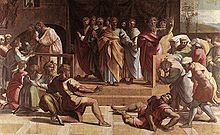Bible: What Does 1 Corinthians 11 Teach Us About Subordination, Communion, and the New Covenant?
The Apostle Paul

Adam and Eve

Subordination
Do you accept the Bible's teaching on subordination?
Subordination in the Church
Christians should mimic Paul’s exemplary life as he seeks to imitate Christ (v. 1).
[Verse 1 belongs in thought with chapter ten.]
The apostle commends the Corinthian believers for praying for him and for keeping the doctrine he spoke to them (v. 2).
However, they seem to need a refresher course on the subordination issue, so he reminds them of a three-tiered hierarchy: Christ is the executive over every male; males supervise females; and God presides over Christ (v. 3).
[Of course, this teaching is highly controversial, especially the male-female tier.
God arranges the order in which relationships proceed; the order does not suggest females are inferior to males any more than it does the Son is in any way inferior to the Father.]
When a man is praying or prophesies (that is, preaches), he should not cover his head; on the other hand, if a woman prays or prophesies without a head covering, the practice “dishonors her head” (vv. 4-5).
[Does the verb “prophesy” mean preach a sermon (for instance), or does it mean foretell the future?
What does “dishonor her head” mean?
Earlier, Paul wrote that the man is the head of woman.
Therefore, is he saying that when a woman prophesies or prays without a veil or head covering, she dishonors her husband?
If her head is not her husband but her own head, how does this activity dishonor her?
What does it mean to have a dishonored head?]
Paul considers an unveiled woman preacher as equivalent to a bald (shorn) woman—a decidedly shameful circumstance (vv. 5b-6).
[Is it shameful for a woman to have short hair?
If such is the case, why is it so?]
Verse 7 indicates that the cover is dishonoring in a certain way when the man, as an image bearer and as a reflector of the glory of God, prays with one on his head.
The verse places the female, as coming out of Adam and made for man’s completion (vv. 8-9; cf. Gen. 2:18, 21-23), on a subordinate level.
[Did God only make Adam in the image of God?]
Besides citing man’s priority in creation and in his role as leader, Paul also offers the presence of the angels as a reason why the female should have a “symbol of authority” on her head (v. 10).
[Ryrie conjectures that, as totally subordinate creatures, angels feel offended when they see an insubordinate woman in church services (New Testament Study Bible, 303).]
Males cannot exist without females, and neither can females exist without males (v. 11); God took Eve from Adam’s side, and females give birth to male children.
Ultimately, both sexes originate from God’s creative activity (v. 12).
Paul asks rhetorically whether women should pray with their head uncovered, arguing that for the natural realm God gave women long hair as a glorious covering; however, long hair for men dishonors them (vv. 13-15).
Therefore, women should wear a veil during religious services.
[A difficult passage, this discussion about hair length and veils/coverings seems to be a culturally bound tradition.
Ryrie, however, thinks that it has a theological, not a cultural basis.
Should the modern American church, therefore, follow this principle, and teach that women should wear veils?]
Paul is convinced that this custom of veil-wearing women is the right one, and thus he teaches it in all of the local assemblies (v. 16).
The Site of the First Communion

Communion
view quiz statisticsCondemnation of Agape Feast Practices
Just as Paul once commended the Corinthians for following his oral teachings, so now he rebukes them for their communion and agape feast practices (see v. 2; v. 17).
Their fellowship meetings manifest divisions, according to reliable reports Paul has heard (v. 18).
However, he warns that these factions are inevitable; they will show the identities of both troublemakers and those who exemplify proper Christian conduct (v. 19).
The apostle lays out the problem as follows: some of the wealthy are bringing food for the agape feast and not sharing it with those in need; some are even drinking too much wine and becoming intoxicated.
This approach, Paul says, is not the way to administer the Lord’s Supper (vv. 20-21).
He is not at all pleased with the selfish behavior of the rich in not providing for the poor—fellow believers who feel ashamed that they can bring nothing to the feast (v. 22).
Instruction About Communion and the New Covenant
Paul now delivers detailed instruction about the communion service itself and disciplinary measures stemming from it (vv. 23-34).
First, the apostle informs the Corinthian church that the Eucharist ceremony is divine revelation he is now passing down to them (v. 23a)
["Eucharist" is from the verb eucharisteo, to give thanks.]
Second, he points out that the initial Lord’s Supper took place on the night of Jesus’ betrayal when, after thanking the Father for the unleavened bread they had acquired for the Passover, the Lord broke it in pieces, distributed the fragments among His disciples, and commanded them to eat their portion “in remembrance of Me” (v. 24).
When Christ referred to the bread as His body “which is broken for you,” He did not mean that the bread was literally His body, but that it merely symbolized His substitutionary sacrifice (v. 24b).
Likewise, the wine (for which He thanked God) represents, but does not magically transform into, His blood (v. 25).
Jesus ratified the New Covenant on that Thursday evening; its fulfillment must wait until the Millennium when the saved nation of Israel will share in it (see Jeremiah 31:31-35).
[Citing from Jeremiah 31 in the author's Old Testament Commentary: “The next ‘the days are coming’ portion deals with the important teaching of the new covenant (vv. 31-37).
First, note that Yahweh makes this covenant with the united Jewish people; no literal way exists for the Church to be involved in this covenant, at least from verse thirty-one (see 1 Corinthians 11 and Hebrews 10).
The new covenant is not ‘according to’ the old Mosaic covenant; Moses' law was conditional, and Israel broke it through sin (v. 32).
This ‘new’ one, however, is unconditional, meaning that God Himself alone will fulfill it (v. 33). Again, note the covenant formula (cf. 30:22; 31:1).
Israel will come to know God through His forgiveness and "forgetfulness" (v. 34).
Jeremiah employs two illustrations—the ages-long shining of the heavenly bodies and the immeasurable dimensions of the universe—to demonstrate the unconditional nature of God's new covenant with Israel.
Just as the sun, moon, and stars will never stop shining, and no one will ever calculate the heavens' immensity, so neither will God reject Israel forever (vv. 35-37).
The final section delineates the new extensions of Zion and the renewed sacredness of once-defiled areas of the city in the days when Messiah will rule over the Earth (vv. 38-40).]
Paul informs his readers that each time they participate in Communion, they preach the gospel (“proclaim the Lord’s death”); they should regularly celebrate the service and continue to do so until the Rapture [v. 26].
An Example of Church Discipline

Disciplinary Matters
After sharing this fundamental instruction, Paul moves on to disciplinary matters associated with the improper practice of Communion (vv. 27-32).
Participating “in an unworthy manner”—perhaps presuming to fellowship with Christ with unconfessed sin on one’s soul—makes one guilty of “the body and blood of the Lord” (vv. 27-28).
[This sin suggests indifference toward Christ’s sacrifice (“not discerning the Lord’s body”), and merits divine chastening [v. 29.]
Paul delineates several of the methods God uses to discipline His sinning children (v. 30).
The Lord usually “spanks” His own with weakness or sickness, but sometimes He chastens them to death; the world, however, He will condemn (v. 32).
The only way true believers may avoid this outcome is through self-judgment (v. 31).
Paul concludes this instruction about the Lord’s Supper by commanding the wealthy to wait for the poor to arrive at the agape feast.
If they cannot endure the hunger, they should eat at home and not even attend (vv. 33-34).
© 2013 glynch1







